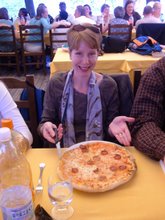 During my sophomore year of college I had a professor who shared this mantra with his students: be one on whom nothing is lost or wasted. Use every experience to learn, grow, and become the best that you can. Although its meaning was somewhat lost on me at the time, I understand it completely now. I was reminded of Dr. Backes’ passion for teaching and learning as I read Rafe Esquith’s book, Lighting Their Fires: Raising Extraordinary Children in a Mixed-up, Muddled-up, Shook-up World.
During my sophomore year of college I had a professor who shared this mantra with his students: be one on whom nothing is lost or wasted. Use every experience to learn, grow, and become the best that you can. Although its meaning was somewhat lost on me at the time, I understand it completely now. I was reminded of Dr. Backes’ passion for teaching and learning as I read Rafe Esquith’s book, Lighting Their Fires: Raising Extraordinary Children in a Mixed-up, Muddled-up, Shook-up World.This book is a thoughtful discourse on how we can and must do a better job of raising and educating kids today. It’s a must read for any educator, parent, or youth-centered professional, especially if your enthusiasm has waned or you’re beginning to believe that your effort is similar to rowing a boat upstream. The author has been there himself and acknowledges the cultural inertia that leads to this sort of discouragement.
America’s education problem, Esquith says, stems from being overly concerned with giving kids the material things they need to be educated (e.g. laptops and textbooks) and insufficiently concerned with providing tools and processes that will make a substantive, lasting difference in their lives, giving them the ability to think. He enumerates the ways in which we betray kids, sometimes with the best of intentions and sadly, sometimes with no intention at all.
Although he writes passionately about the changes we need to make at home and in the classroom, the book is salted with humility. That helps the whole thing go down a little easier. Especially when you realize that the bedrock values he believe kids need to reach their full potential are probably antidotes for what ails many of us grownups today—arrogance, selfishness and a host of other character defects. For how can we equip kids with these skills and traits when we lack them ourselves?
Throughout the book, Esquith cites literature and films that reinforce lessons extraordinary kids must learn. As a practicing children’s librarian, I just love that. There is nothing quick, formulaic or simple about his approach to raising kids who succeed in life. Esquith admits it takes a complex mix of prolonged and seemingly small acts among the adults who steer them through childhood and adolescence. Even when kids learn discipline, perseverance, humility, discernment, time management, generosity, delayed gratification, gratitude, personal responsibility and courage, they can still slip up and make poor choices. Toward the end of the book, there is a wonderful section to help parents and kids evaluate colleges and universities.
Although the author isn’t a parent, he is an award-winning teacher who knows whereof he speaks. His former students, many from underprivileged families in Los Angeles, have graduated from some of the most prestigious universities in the world. He has received numerous awards including the president’s National Medal of the Arts, the American Teacher Award, Parent magazine’s As You Grow Award, People magazine’s Heroes Among Us Award, and Oprah Winfrey’s Use Your Life Award—not that the outward trappings of success mean anything to him. A thing worth doing should be done for its own sake—not to impress others. Getting that wrong is just one of the many ways Esquith says we can warp kids into doing the right things for all the wrong reasons. Esquith’s wisdom can do more than help kids be successful. It can help develop the habits and character that make for a happy and fulfilled life. Read it and you’ll vow to do better by the kids you’re responsible for teaching or raising.










